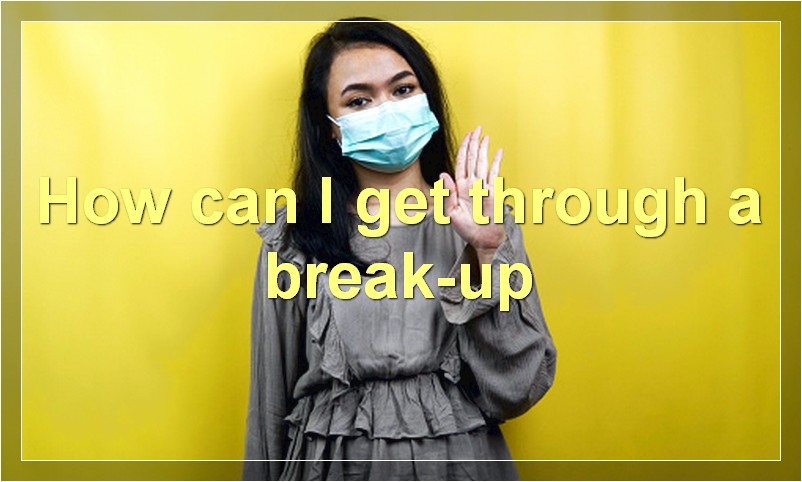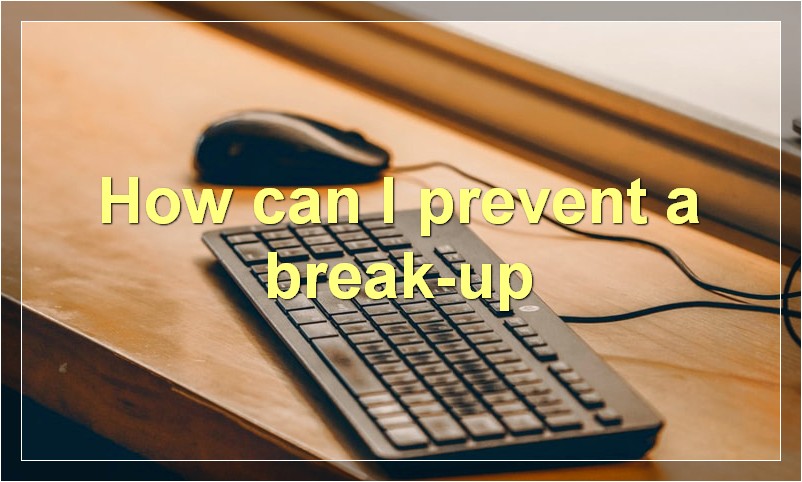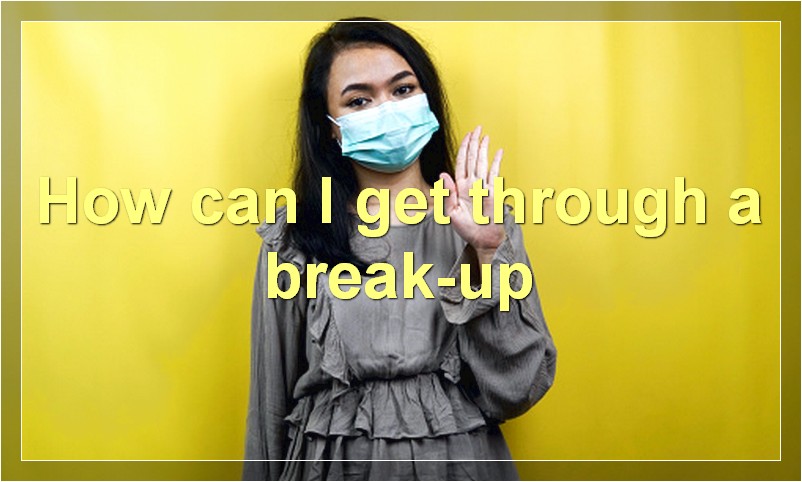Going through a break-up is never easy. You may feel like you’re in a dark hole that you can’t get out of. But there is light at the end of the tunnel. Here are 10 stages of a break-up and how to get through them:
How can I get through a break-up?

It’s never easy to go through a break-up, especially if you were the one who was dumped. If you’re struggling to get over your ex, here are some tips that might help.
First, give yourself time to grieve. It’s normal to feel sad, angry, hurt, and confused after a break-up. Allow yourself to feel those emotions instead of pushing them away. Don’t try to distract yourself from the pain by drinking too much, partying, or sleeping around. These things might temporarily make you feel better, but they won’t help you in the long run.
Second, take care of yourself. A break-up can be emotionally draining, so it’s important to take care of yourself both physically and emotionally. Make sure you’re eating healthy foods, getting enough sleep, and exercising regularly. It might also help to talk to a therapist or counselor who can help you deal with your feelings.
Third, stay busy. One of the best ways to get over a break-up is to keep yourself busy. Throw yourself into work, hobbies, or other activities that you enjoy. This will help you take your mind off your ex and prevent you from wallowing in self-pity.
Finally, don’t compare yourself to others. Everyone deals with break-ups differently, so don’t compare your healing process to that of your friends or family members. Some people move on quickly while others take longer. As long as you’re making progress, that’s all that matters.
What are the signs that a break-up is coming?
When a break-up is looming, it’s often preceded by some tell-tale signs. If you’re noticing any of these in your relationship, it may be time to start preparing for the end.
1. You’re fighting more than usual
If you and your partner are bickering more than usual, it could be a sign that tensions are running high. This is especially true if you’re arguing about the same things over and over again, with no resolution in sight. If you find yourself dreading fights or feeling like they’re never-ending, it may be a sign that your relationship is heading for a breaking point.
2. You’re growing apart
When two people are in a long-term relationship, it’s normal for them to grow and change over time. However, if you feel like you and your partner are growing further and further apart, it may be an indication that your relationship is no longer working. If you’re not on the same page as your partner anymore, it can be tough to find common ground.
3. You’re not as intimate as you used to be
Intimacy encompasses both physical and emotional connection. If you’re feeling distant from your partner both physically and emotionally, it may be a sign that your relationship is in trouble. A lack of intimacy can leave both partners feeling disconnected and unfulfilled.
4. You’re making plans without each other
If you find yourself making more plans without your partner than with them, it’s a sign that you’re growing apart. It’s natural to want to spend time with friends and family, but if you’re excluding your partner from your plans more often than not, it’s not a good sign for the future of your relationship.
5. You’re keeping secrets from each other
Secrets can be harmless white lies or something more serious, but either way, they’re a sign that you’re not being fully honest with each other. When couples stop being transparent with each other, it creates an atmosphere of mistrust and can eventually lead to the breakdown of the relationship.
How do I know if I’m ready for a break-up?
If you’re considering a break-up, there are a few things to think about first. Is your relationship healthy? If you’re not sure, ask yourself these questions:
Do you and your partner communicate openly and honestly?
Do you feel respected by your partner?
Do you feel like your partner is supportive of your goals and dreams?
Do you and your partner have fun together?
Do you trust your partner?
If you answered “no” to any of these questions, it might be time to reconsider your relationship. If you’re not happy with the way things are, talk to your partner about it. If they’re not willing to make changes, then breaking up might be the best option.
There’s no right or wrong answer when it comes to deciding whether or not to break up. Ultimately, you have to do what’s best for you. If you’re not sure what that is, consider talking to a therapist or counselor who can help you figure out what’s best for you.
What are the consequences of a break-up?
It is no secret that breakups can be painful. They often involve a lot of heartache, tears, and sometimes even anger. But what about the other consequences of a break-up? What happens to our bodies and minds when we go through a split?
Most of us are familiar with the physical symptoms of a break-up. We may lose weight or sleep, or we may find ourselves comfort eating or drinking more than usual. We may also suffer from headaches, stomachaches, or other physical ailments. These physical symptoms are often a result of the stress we experience during a break-up.
But did you know that there are also some mental and emotional consequences of a break-up? For example, you may find yourself feeling depressed or anxious. You may have trouble concentrating at work or school. You may even find yourself questioning your self-worth or wondering if you will ever find love again.
The good news is that these mental and emotional effects of a break-up are usually temporary. With time, most people are able to pick themselves up and move on with their lives. However, there are some people who struggle to recover from a break-up. If you find yourself in this situation, it is important to seek professional help. A therapist can assist you in working through your emotions and help you develop healthy coping mechanisms.
In conclusion, a break-up can have both physical and mental consequences. However, these effects are usually temporary and most people are able to recover with time. If you find yourself struggling to cope, seek professional help.
How can I prevent a break-up?

No one wants to experience the heartbreak of a break-up, but sometimes it’s unavoidable. While there’s no surefire way to prevent a break-up from happening, there are some things you can do to minimize the risk.
Here are five tips on how to prevent a break-up:
1. Communicate openly and honestly with your partner.
One of the best ways to prevent a break-up is to communicate openly and honestly with your partner. If you’re feeling unhappy or unsatisfied in the relationship, don’t be afraid to talk about it with your partner. By communicating your feelings, you can work together to find a solution that works for both of you.
2. Be supportive of your partner.
Another way to prevent a break-up is to be supportive of your partner. Everyone goes through tough times, and it’s important to be there for your partner during those times. Offer them your support and understanding, and let them know that you’re always there for them.
3. Be willing to compromise.
In any relationship, there will be times when you need to compromise. If you’re not willing to budge on certain things, it could lead to tension and conflict in the relationship. Instead, try to be flexible and open-minded, and be willing to meet your partner halfway.
4. Don’t take each other for granted.
It’s easy to take your partner for granted when you’ve been together for awhile, but it’s important to remember why you fell in love with them in the first place. Make an effort to show them how much you appreciate them, and let them know how lucky you feel to be with them.
5. Seek help if you’re having difficulties.
If you’re struggling with communication or other issues in your relationship, don’t hesitate to seek out professional help. A therapist can help you and your partner work through your problems, and they can provide valuable insights and tools that can help prevent a break-up.
How do I deal with the pain of a break-up?
It’s official, the relationship is over. You have been dumped, left heartbroken and feeling pain like you have never felt before. This is the end of the road; your life as you know it has come to an abrupt halt. But don’t despair, there is hope! You can get through this tough time and come out the other side a stronger, wiser person. Here are some tips on how to deal with the pain of a break-up:
1. Acknowledge your feelings
The first step to dealing with any problem is to acknowledge that it exists. Don’t try to bottle up your emotions or pretend that everything is okay when it clearly isn’t. It is normal to feel upset, angry, confused and even relieved after a break-up. Allow yourself to grieve for your loss and don’t be afraid to express your feelings.
2. Talk about what happened
If you can, try to talk to someone about what happened. This could be a friend, family member, therapist or even a hotline. Talking openly and honestly about your break-up can help you to make sense of what happened and start to move on.
3. Write down your thoughts and feelings
Writing can be a therapeutic way of dealing with difficult emotions. Get a journal and write down your thoughts and feelings about the break-up. Let all your pent-up emotions out on the page!
4. Avoid unhealthy coping mechanisms
In the aftermath of a break-up, it is tempting to turn to alcohol, drugs or casual sex as a way of numbing the pain. However, these are all unhealthy coping mechanisms that will only make you feel worse in the long run. If you find yourself turning to these things, try to find healthier alternatives such as exercise, hobbies or talking to friends.
5. Give yourself time to heal
There is no magic cure for a broken heart but time does heal all wounds. Give yourself time to grieve and process what has happened. In the meantime, focus on taking care of yourself both physically and emotionally. Eat well, exercise, get plenty of sleep and do things that make you happy. Slowly but surely, the pain will start to fade and you will be able to move on with your life.
What are the steps to getting over a break-up?
1. Don’t do anything drastic.
It can be tempting to want to make a clean break after a relationship ends, but resist the urge to do anything rash. This is especially true if you’re the one who was dumped – it’s easy to want to get revenge by dating someone else immediately or doing something to make your ex jealous. But trust us, it’s not worth it in the long run. You’ll only end up feeling worse, and you might even ruin your chances of getting back together (if that’s what you want).
2. Take some time for yourself.
If you’re feeling lost and confused after the break-up, that’s perfectly normal. It takes time to adjust to being single again, so give yourself a few days (or weeks) to just focus on you. Do things that make you happy, and don’t worry about what other people are doing or saying. This is your chance to really figure out who you are and what you want in life – without any distractions.
3. Lean on your friends and family.
Your loved ones can be a huge support system during this difficult time. They’ll be more than happy to lend a listening ear or a shoulder to cry on, so don’t be afraid to reach out to them. Just know that they’re there for you – no matter what.
4.Talk about what happened.
If you’re struggling to make sense of your emotions, talking about the break-up can actually be really helpful. Whether you confide in a trusted friend or write down your thoughts in a journal, getting everything out can help you start to move on. Just make sure that you’re doing it for the right reasons – not to try and hurt your ex or make them feel guilty.
5. Give yourself time to grieve.
Ending a relationship is like losing a loved one, so it’s important to allow yourself to grieve the loss. This doesn’t mean wallowing in your sorrows 24/7 – but it does mean giving yourself permission to feel sad, angry, or whatever other emotions come up. Once you’ve acknowledged how you’re feeling, it’ll be easier to start moving on.
6. Create a positive outlook for the future.
One of the best ways to get over a break-up is to focus on the future – specifically, all the amazing things that are waiting for you. So start making plans! Set some goals and start working towards them, whether that means taking a trip somewhere new, signing up for an online dating site, or simply spending more time with your friends and family. The sky’s the limit – so dream big!
Is there life after a break-up?
When a relationship ends, it can feel like your world is crumbling. You might find yourself feeling lost, confused, and alone. You might wonder if you will ever find love again. But there is hope. Here are five things to keep in mind that can help you get through a break-up:
1. Give yourself time to grieve.
It’s important to allow yourself to mourn the loss of the relationship. This doesn’t mean wallowing in your sorrows for weeks on end—but it does mean giving yourself some time to process what has happened. Cry if you need to, write in a journal, or talk to a friend. Just don’t try to bottle up your emotions, as this can lead to further pain down the road.
2. Don’t dwell on what might have been.
It’s easy to get caught up in regrets after a break-up. But dwelling on what might have been will only make you feel worse. Instead, focus on the present and the future. What are you going to do now that the relationship is over? What do you want to achieve in the coming months and years? These are the things that should occupy your mind—not what could have been.
3. Take care of yourself.
During a break-up, it’s easy to let your health and wellbeing fall by the wayside. But it’s important to take care of yourself, both physically and mentally. Eat healthy meals, exercise regularly, and get plenty of rest. Also, be sure to find healthy ways to cope with your emotions, such as talking to a therapist or counselor.
4. Don’t rush into another relationship.
It’s common to want to find another partner right after a break-up. But jumping into a new relationship too quickly can often lead to more heartache in the long run. Give yourself time to heal before you start dating again. And when you do start seeing someone new, take things slow at first—don’t rush into anything serious too quickly.
5. Believe that you will find love again.
Finally, it’s important to believe that you will find love again someday. Yes, the pain of a break-up can feels all-consuming at times—but it won’t last forever. There are other fish in the sea, and you will find someone new who makes you happy. Just keep your head up and keep moving forward—the right person will come along when you least expect it.
How do I know if I’ll never recover from a break-up?
When you’re in the thick of a break-up it can feel like you’ll never recover. The pain is all-consuming and you can’t imagine ever feeling better. But eventually, the hurt does start to fade and you can begin to pick up the pieces of your life. However, for some people, the pain never really goes away. They never truly recover from the break-up. So how do you know if you fall into this category?
There are a few key signs that indicate you may never really get over your ex. If you find yourself still thinking about them constantly, months or even years after the break-up, then it’s a sign that you haven’t been able to move on. Similarly, if you still compare every new person you meet to your ex, or find yourself hoping to run into them again, it shows that they still have a hold on you.
If you find it impossible to imagine a future without your ex, then it’s likely that you’ll never fully recover from the break-up. When you’re stuck in the past, it’s difficult to move forward. You may even try to sabotage new relationships because you’re afraid of getting hurt again.
It’s normal to need some time to grieve after a break-up. But if the pain is so intense that it interferes with your everyday life, then it may be a sign that you won’t ever recover. If you can’t eat, sleep, or focus on anything else, then it’s time to seek professional help. Often, talking to a therapist can help you work through your emotions and finally start to move on.




